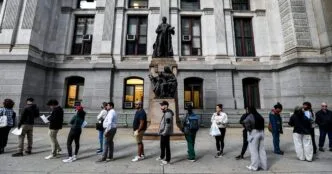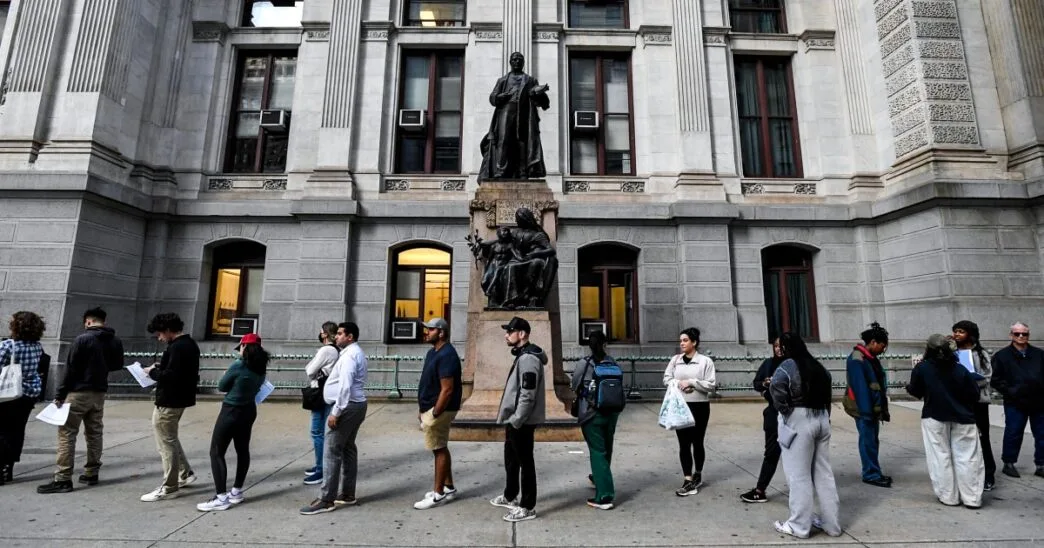With Pennsylvania expected to be a close and crucial state in the 2024 race for the presidency, it’s unusual election laws are again under the microscope.
First, there’s the counting. The state doesn’t have early voting — instead offering the time-consuming and paperwork heavy option of on-demand mail balloting. It also doesn’t process its mail ballots ahead of Election Day.
So, in the hours after polls close on Election Day, when many battleground states will be reporting their early, mail and Election Day totals, Pennsylvania will be counting ballots around the clock in a mad dash to catch up.
Then there’s the “fixing” or “curing” of ballots with minor errors, such as mail-in ballot mixing a signature. If a ballot has errors, each county in the state decides on its own whether it will let voters “fix” them, creating significant differences in voting policy throughout the state. (Most states have a statewide policy for curing ballots.)
And finally, after the ballots are counted, there can be challenges. Pennsylvania laws give residents a spate of ways to challenge and delay certification of the results with recounts, appeals, and litigation.
Election experts say Pennsylvania’s laws make it fertile ground for rigged election claims to flourish. They also stressed that there is little reason to believe that unsubstantiated voter fraud claims—and any lawsuits associated with them—will actually stop the certification of the results.
“The Pennsylvania legislature had multiple opportunities to clarify and improve the state’s election law,” said Nate Persily, an NBC News election law expert and professor at Stanford Law School. “It deliberately chose not to. The gaps in the law provide a vacuum that gets filled with conspiracy theories and require the courts to bring coherence to an incoherent regime.”
Former President Donald Trump and his campaign are already targeting Pennsylvania, falsely claiming there is large-scale “cheating” and “voter fraud” at play.
Trump’s campaign has repeatedly portrayed the long lines in Bucks County during on-demand mail balloting as a form of voter suppression that, according to vice presidential candidate J.D. Vance, was “voter fraud” perpetrated by Democrats. (The state’s Republican secret of the commonwealth, Al Schmidt, rejected Vance’s claim.)
“They’ve already started cheating in Lancaster, they’ve cheated. We caught ‘em with 2600 votes,” Trump said at a recent rally, misconstruing a real incident where hundreds of fraudulent voter registration applications were identified and rejected in Lancaster County, Pennsylvania.
This type of disinformation campaign is what worries Wendy Weiser most. As vice president for democracy at the Brennan Center for Justice at NYU Law School, Weiser said she isn’t concerned that partisans will somehow block the certification of the results. “Those are not battles that are going to succeed,” she told NBC News recently.
But she fears that Trump’s “disinformation campaign” and “broad propaganda efforts” will “cause people to think there is something wrong with the election,” she said. “That’s a huge danger that we’re already in.”
Once the results are counted, there are several ways for the Trump campaign — if it loses — and its allies to challenge the results.
“We should expect a spate of local litigation throughout the state in the immediate aftermath of the election, not because those suits are meritorious, but because Pennsylvania law is rife with such opportunities,” said Michael Morse, an NBC News election law expert and professor at the University of Pennsylvania Law.
State law allows any “aggrieved” person who disagrees with how a county board handled its results to appeal them within two days, something that will delay certification temporarily, Morse said in an email. Limited recounts can be demanded by as few as three voters in a precinct, per state law, something that helped delay Pennsylvania’s 2022 result certification by weeks.
But the Commonwealth Court of Pennsylvania has tightened the standard for such a recount, requiring petitioners to identify and show evidence that fraud or error occurred, Morse said.
Trump supporters on county boards across the country have sought to block the certification of election results by delaying or voting against the certification in the past.
All three experts, though, agreed that Pennsylvania’s courts have tools and legal precedents that allow them to force certification of the results when no credible claims of large-scale voter fraud exist.
State courts have also taken steps to ensure that legal challenges are handled swiftly. The state Supreme Court has expedited its election appeal period from ten to three days to ensure that the state certifies its results by the December 11th federal deadline created by the Electoral Count Reform Act, enacted in 2022 to clarify the counting of presidential election results.
“The concern to me is less certification of the vote by December 11,” Morse said. “Than the collateral damage to voter confidence that bad-faith actors can easily inflict along the way.”













